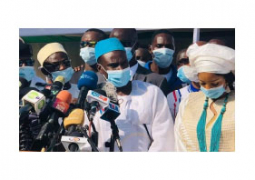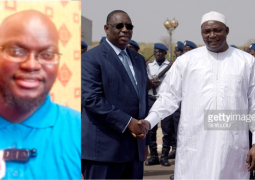While recommenced his testimony, in the early stages of his testimony, Chairperson Jainaba Bah highlighted section 504 of the Financial Manual, which places the responsibility for controlling expenditures squarely on the finance director, thus placing liability on him or her for all unauthorized spending.
The crux of the revelations revolved around the 2020 and 2021 Audit Report for the Mansakonko Area Council, which exposed the disposal of three vehicles without due process.
The audit report disclosed that the vehicles, including two Mitsubishi Pajeros, a Toyota Hilux, and a Volvo, were sold for a total of D250,000, well below the initially agreed-upon price of D550,000.
Under meticulous scrutiny from Deputy Lead Counsel Patrick Gomez, Sallah confessed that the decision to lower the price was made without formal approval from the contracts committee that had set the initial price, with the CEO and himself unilaterally deciding on the reduction.
Counsel Gomez grilled Sallah on his alleged negotiation with buyers and his own purchase of one of the vehicles. Initially denying any personal benefit, Sallah later admitted to assisting someone else in acquiring a vehicle.
Tremor struck the hall of hearing when Gomez confronted him with a declaration form, revealing that Sallah had sworn under oath that he had no interest whatsoever in the vehicles.
"Why did you lie on oath?" demanded Gomez, to which Sallah was left silent and unable to utter a word in response.
As hearing advanced the deputy lead counsel was able to satisfactorily establish that there was no proper auction for the vehicles – a violation of established rules.
Further pressed on this lack of adherence to statutorily established rules, Sallah emerged speechless. Although it could not be established whether it was out of the fear of greater self-implication or out of guilt, Sallah apparently zipped the mouth as tightly as possible.
As raised before the Commission, the audit report conclusively labelled their actions as fraudulent, a label to which Sallah reluctantly agreed.
He however revealed that, at the time of the vehicle disposal, there was no disposal committee in place as required by the GPPA Act, further compounding the irregularities.
The Local Government Commission of Inquiry at Djembe Hotel continues to unknot systemic corruption and pervasive official wrongdoing in councils nationwide, sending shockwaves through the local governance hierarchy.
As serious and even more serious revelations continue to turn up, the public awaits further disclosures and accountability for those implicated in these scandalous dealings.
Inquiry commission unearths bigger financial scandals
The Djembe Hotel down the Senegambia Beach Wednesday played host to a gripping continuation of the Local Government Commission of Inquiry, as former finance director Bai Gibbi Sallah faced a tough probe regarding financial mismanagement during his tenure at Mansakonko Area Council.
The inquiry focused on the 2020 and 2021 Audit Report for the Mansakonko Area Council, bringing to light critical issues of financial misconduct.
As the witness reappeared, in the early stages of his testimony, Chairperson Jainaba Bah dropped a shell in the hall, citing Financial Manual Section 504, which states the finance director’s responsibility for controlling expenditures and liability for unauthorized expenditures.
Sallah, in his testimony, confessed to bypassing procurement rules, admitting to printing private receipts for the conference centre and procuring receipt books against established protocols, protocols such as getting all receipt books from the Gambia Printing and Publishing Corporation (GPPC) as established by the Financial Manual.
Pressed on whether he followed established procurement rules when he was buying them from private printing establishments, he said he did not but had obtained authority from his CEOs then, although he was not able to provide evidence.
“It was verbal,” he said.
Commissioner Alagie Sillah at a certain point during the hearing interrupted the counsel to ask: “Was it correct to acquire private receipt books? Commissioner Alagie Sillah asked.
In his response, Sallah said that they did not know at the time but “The GPPC [receipt books] were more expensive than the privately acquired books”.
He added that there was a “resolution” to that effect. Although he claimed that he could recall how many receipt books he had printed, there was no documentary evidence that explicitly indicated the number of receipt books.
Hence, he had to agree to the indication of Deputy Lead Counsel Patrick Gomez, who led the session, that it was impossible to estimate the amount of revenues that were collected due to this lack of adherence to procurement rules in the process of buying the receipt books.
It was later established that over 30 receipt books were printed. The first 10 books were procured during the tenure of former CEO Pa Sait Ceesay and the 20 others were procured during former CEO Seedy K. Touray’s time.
The witness said he carried out the procurement on the instructions of the ex-CEOs.
Moreover, Counsel Patrick Gomez raised the fact that auditors discovered the duplication of receipt books, which was not reflected in the cash books, and untraceable funds amounting to millions due to improper actions.
Sallah claimed ignorance of “duplications of receipt books” at the initial stages: “I came to know about it after the audit process. I was not aware of this until after the audit.”
The former finance director shifted blame to the conference manager, a subordinate to him, who had appeared before the Commission and equally blamed him.
As revealed by the counsel during hearing, the audit also stated that a million dalasis plus was received from 7 receipt books.
“Out of the 30, only 7 could be traced,” Counsel Patrick said.
The witness said they only used 3 books from the second consignment of 20 books. Counsel Gomez put it to him that that could not be ascertained because, as contained in the audit report, some of the receipt books were duplicated.
The deputy lead counsel proceeded to ask: “If you can generate more than one million from 7 books, how much do you think you can collect from the remainder of the books?”
The witness remained silent without a word. Cornered at some point, he accepted that “millions were lost” as asserted by the deputy lead counsel.
As raised before the Commission, auditors recommended in the report the recovery of substantial amounts from the council's accounting officer and the conference centre manager.
“You were the one who procured the private receipt books. You are also the head of the finance unit. Everything that happens takes place under your watch since you give instructions. So, you know where the money was. You are on top of things,” Counsel Gomez said.
Furthermore, Counsel Gomez queried the lack of records and accountability, leaving Sallah on the defensive. The auditors' revelation that GTR books were not submitted for inspection added another layer of suspicion to the ongoing investigation.
With the former finance director failing to produce evidence of deposited funds amongst other allegations, the inquiry was adjourned to the subsequent day, which witnessed grimmer session discoveries about the dubious dealings that have rocked the Mansakonko Area Council.




